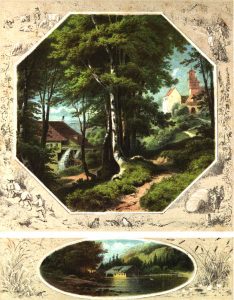Here is my translation of the poem that opens Heinrich Heine’s delightful travel narrative Die Harzreise (1826). This poem is all about how it feels to leave the city of Göttingen — famous, he tells us, for its sausages and its university — to walk in nature among simple mountain folk.

| Schwarze Röcke, seidne Strümpfe,
Weiße, höfliche Manschetten, Sanfte Reden, Embrassieren – Ach, wenn sie nur Herzen hätten! |
Black their skirts and silken stockings,
White their cuffs, so fine and neat, Tender speeches, sweet embraces – Would that hearts within them beat! |
| Herzen in der Brust, und Liebe,
Warme Liebe in dem Herzen – Ach, mich tötet ihr Gesinge Von erlognen Liebesschmerzen. |
Had they hearts in loving bosoms,
Love aglow within their hearts – How I tire of their crooning, Spare me their deceitful arts. |
| Auf die Berge will ich steigen,
Wo die frommen Hütten stehen, Wo die Brust sich frei erschließet, Und die freien Lüfte wehen. |
To the mountains I’ll away now,
There are wholesome cabins found, There the breast can swell unfettered, And the wind blow freely round. |
| Auf die Berge will ich steigen,
Wo die dunkeln Tannen ragen, Bäche rauschen, Vögel singen, Und die stolzen Wolken jagen. |
To the mountains I’ll away now,
There the dark pines loom on high, Brooks are rushing, birds are singing, Clouds go speeding boldly by. |
| Lebet wohl, ihr glatten Säle!
Glatte Herren! Glatte Frauen! Auf die Berge will ich steigen, Lachend auf euch niederschauen. |
So farewell, ye shallow halls!
Shallow ladies, shallow men! To the mountains I’ll away and Laugh as I look down again. |

I care a lot about meter, and in German each of the lines ends in an unstressed syllable, so my first draft preserved that. However, those kinds of rhymes (feminine rhymes: Manschetten/hätten, Herzen/Schmerzen) occur more easily in German because if you pool all the infinitives and verbs conjugated for 1st and 3rd person plural, as well as a large percentage of plural nouns, you have a ton of words ending in unstressed “-en”. Feminine rhymes in English (mountain/fountain, passion/fashion) tend to require more rumination. They also risk sounding too cute.
After getting a first draft down, I considered that this is supposed to be a poem you dash off as you pack your things. You leave it on your desk for your poseur university friends to find, and maybe they’ll tell those girls you met the other night that you are so over them.
So I reworked it with easy one-syllable (or masculine) rhymes, the kind that would occur to you easily as you put on your hiking boots. This means the meter is a little different from the original, but I’m happy with the result.
I was particularly happy with “shallow halls,” which sounds like a contemptuous play on “hallowed halls;” initially I had tried “glib” because of its closeness to “glatt.”
My in-house critic pointed out that it might not be OK to rhyme “again” with “men” in old-timey poetry. He may be right! But for the moment I’m declaring this one done. By the way, I didn’t consult any existing English versions for this and I still haven’t, so any similarities to other translations are purely coincidental.
I think this poem succeeds as a poem, Laura — I can’t judge it as a translation because I don’t know German. The one line that gives me pause is “To the mountains I will climb now.” It could be correct, of course, but the problem is that I tend to think of someone climbing *the mountains*, not climbing *to* them. But after the initial pause I decided it was fine.
The rhythm is rather similar to that of Tennyson’s “Locksley Hall” (written 1835), which is pleasing since the two poems are chronologically close.
I finally edited that line because I don’t like it either.
This may actually work for the “Urban Life in the European City” course I’m TA’ing this fall. The professor is German too, if that makes a difference…